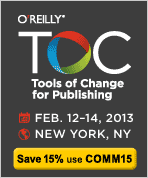We’re often told in publishing to look to other media for inspiration for the digital transition. Indeed, I have been an often vocal and staunch supporter of bringing in skills from other industries to help us build the skillsets we need to survive the changeover and there is certainly still a talent gap.
However, other media industries don’t always get it right. Music certainly didn’t, whilst film is struggling to balance the cinema/boxed goods model against the increasing on-demand requirements of its core userbase, TV is having to deal with dramatically falling ad revenues and time-shift boxes which cut out the advertising.
Games, though – those guys are digital natives, right? If there was ever an industry built to withstand a shift to digital distribution, the game industry is it, surely?
Well, yes and no. That the game industry is growing and has staggering potential is undoubted. However, what I want to explore over the next few posts is where the industry has got it wrong, spectacularly so in some cases, and how unbelievably close the parallels fall with the books space.
 I have had the (mis)fortune to experience a games company getting it utterly wrong first-hand. The lessons I learned during that period were utterly invaluable in forming how I approach any kind of content publishing today.
I have had the (mis)fortune to experience a games company getting it utterly wrong first-hand. The lessons I learned during that period were utterly invaluable in forming how I approach any kind of content publishing today.
I bring up my time at Midway because it gives me a shocking Déjà vu with regards to the current situation at THQ, although there are some crucial differences that are completely relevant to book publishing right now.
I’ll dig into the THQ situation in the next couple of posts, by which time it’s possible that THQ will no longer be a going concern (an asset auction is scheduled for 22nd January), but first I want to paint a picture of where the industry is headed. Much of this is conjecture, as hard data is tough to ascertain and almost certainly NDA’d to the point of having my fingers chopped off, but hopefully it should resonate with the book publishing world.
The first digital pivot
This might sound something of a misnomer, seeing as video games have always been a digital product. However, they’ve traditionally been a digital product sold in a physical form (cartridge, CD, DVD, and now Blu-ray) – it’s the shift from boxed to download product that draws most parallels with our own industry.
Game publishers and book publishers have traditionally operated in a very similar way. We commission a studio (author) to make the game, development (author/editorial) could generally take anywhere between 6 months and 3 years, the publisher creates a marketing/PR plan and then takes care of design, production, sales, logistics, and reporting.
That model is destined to fail. It is destined to fail because the cost of selling a boxed game in sufficient units to make an acceptable ROI represents an astronomical risk, and the vast majority of these boxed games do not make significant profit. Those that do tend to make enormous amounts of cash, but with the High Street shrinking, the multiples putting a huge squeeze on margins, and digital download sales putting pressure on physical goods (not least in terms of pricing) the landscape is hugely challenging. It is a hit-driven retail business in an industry that that is abandoning retail (just this week, HMV in the UK has entered administration).
Games companies (both publishers and developers) are now gearing up for a time when the majority of their business goes direct to digital distribution, and they’re likely to have to make several versions of the same game to reach every market. Sound familiar? For XBLA,PSN, Steam and iOS, read EPUB and mobi, with many variations in between.
Which brings me onto the next shift, which is the subject of tomorrow’s post.